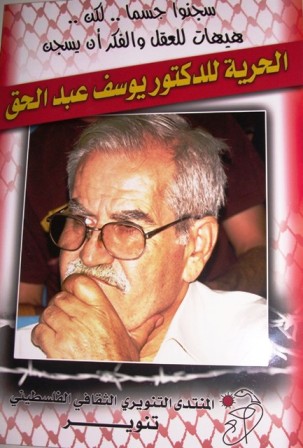Year: 2012
-
Extension of administrative detention of Dr. Yousef Abdul Haq for the second time
31 March 2012 | Tanwer Human beings are born free, but we are surrounded by restrictions everywhere Jean-Jacques Rousseau Today on the thirty-sixth anniversary of the Palestinian Land Day, which confirms for our people the unity and integrity of our case, the unity of its land, and the right of return and self-determination, the Israeli…
-
Video: Dozens of wounded and shooting at Erez border in Beit Hanoun
by Rosa Schiano 30 March 2012 | International Solidarity Movement, Gaza Today we joined the Global March to Jerusalem from Gaza. Israeli soldiers shot continuosly, dozens of people injured, one killed. I made this small video during the march. Some young people show the blood on their hands. Some guys with two motorcycles carried continuously the injured…
-
Swedish peace activist beaten up by Israeli Occupation Forces
by Jonas Weber and Jeff 1 April 2012 | International Solidarity Movement, West Bank A Swedish peace activist at the Land Day demonstration in Qalandia, outside of Ramallah, was arrested. During the arrest he was kicked and beaten by the Israeli soldiers. “It happened so fast, I never understood what was going on before I…


